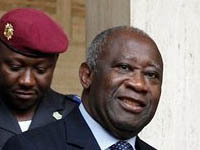Who unleashed civil war in Côte d'Ivoire?
A year ago, the International Criminal Court issued an arrest warrant for former president of Côte d'Ivoire, Laurent Gbagbo, and not that long ago a warrant was issued for the arrest of his wife Simone. The couple is accused of crimes against humanity, mass torture, rape and murder. However, some experts say that the fault also lies with their opponent and French troops.

On November 22nd, 2012 The International Criminal Court in The Hague issued a warrant for the arrest of Simone Gbagbo, the former First Lady of Côte d'Ivoire. According to the International Court of Justice, Simone Gbagbo is accused of numerous "crimes against humanity." According to the BBC, Simone's husband is currently awaiting trial in The Hague. He was also accused of crimes against humanity during the 2010 presidential election.
The arrest warrant says that Simon is charged with four counts, among which are rape, murder and other crimes against humanity. Laurent Gbagbo was brought similar charges and in addition was accused of death of over three thousand people killed in the recent civil war.
The Gbagbo were arrested in Côte d'Ivoire on April of 2011, exactly five months after the presidential election. According to experts of the International Criminal Court, Simon was called a "gray cardinal" by many citizens of Côte d'Ivoire. The riots in the country began after the elections ended not in favor of Gbagbo and he was replaced in office by Alassane Ouattara. Immediately after the announcement of the results, mass riots ensued, the borders were blocked and broadcasting of foreign channels was suspended. Two days after the announcement of the results, the country's constitutional council overturned them, leaving incumbent President Laurent Gbagbo in office.
The refusal to hand over power triggered riots. This conflict began over religious and national reasons as the opposition of the tribes in the south and the north of Côte d'Ivoire has long been known.
Representing South, Laurent Gbagbo did not intend to yield the power to the people from the north represented by a new President Alassane Ouattara. This situation forced Ouattara to push troops to the capital in order to overthrow Laurent Gbagbo. The African Court of Human Rights also had a very negative reaction to the fierce resistance of Gbagbo and called for his immediate surrender.
French troops brought into the territory of the country with an alleged peacekeeping mission to protect French citizens eventually attacked the presidential palace and captured Laurent to hand him over to the supporters of Alassane Ouattara. Laurent Gbagbo continued to demand a recount, however, this time under the control of the UN. His request was denied, and his resistance was declared unlawful. In total, about three thousand people were killed during the civil war. The facts show that the security forces of the state on the direct orders of Laurent detained undesirable citizens suspected of collaborating with the opposing party, and subjected them to brutal torture. According to international human rights organization Amnesty International, over 200 people fell their victims.
Representatives of various countries had different reactions to the events in Côte d'Ivoire. For example, the Russian Foreign Minister Sergey Lavrov was quite skeptical about the actions of the French troops in the country. According to him, Russia wanted to hear an explanation of why the UN troops, despite the mandate that required peacekeepers to be impartial, entered into an armed conflict with local law enforcement agencies.
Some African analysts do not share the opinion of the UN that the civil war was unleashed by the Gbagbo couple. As stated in an interview with EuroNews by an expert on West Africa and a member of Amnesty International Gaëtan Mutu, both sides were guilty of inciting the conflict. According to him, the UN unilaterally identified the perpetrators, which is fundamentally wrong.
After visiting the so-called New Camp, that is, the territory under the control of a new president, Gaëtan Mutu noted that representatives of the security forces of Alassane Ouattara also committed crimes against humanity. According to him, every day 25 to 30 victims came to hospitals, most of them were women raped by members of the new government. The victims could not complain to anyone because the administrative system in the new government was almost non-existent, and the criminals were high ranking officials. In addition, according to Mutu, many people tried to evacuate from the territories occupied by the representatives of Ouattara, but the military tried to stop them from leaving. He cited an example where representatives of the new government arrested a man trying to leave the area in search of refuge, and then beat him and burned him to death.
It turns out that the Gbagbo are not the only ones who committed the crimes against humanity, and representatives of the opposing side are also to blame. However, so far the International Criminal Court is only considering the case of the Gbagbo family.
As for the evaluation of Gbagbo as president, according to a specialist on Africa Philip Hugon, it is hard to give him a positive assessment. He thinks that Côte d'Ivoire requires a more experienced and authoritative leader, who Ouattara may very well be.
At some point, the current president was a Deputy Director of the International Monetary Fund and is well versed in the economics and international politics. This experience should help him run the country.
Sergei Vasilenkov
Pravda.Ru
Subscribe to Pravda.Ru Telegram channel, Facebook, RSS!


